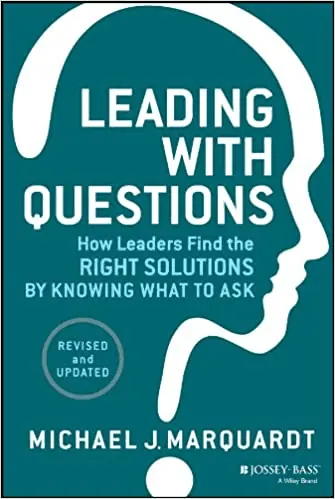
audio
Asking questions has a number of advantages:
Firstly, hey are inclusive - asking the other person for their view or opinion makes them feel valued and included, and therefore more likely to respond positively and collaboratively.
Also you sound less insistent, less demanding; less directive. You are seeking opinions, not telling others what you think. So you are more likely to be seen as more collaborative. In your approach
Thirdly, by asking a question, you are creating the impression that you want to hear what the other person has to say. This will help create an impression that you are open minded, willing to be influenced by the views of others
Asking a question encourages the other person to reply – it’s permission, an invitation, to contribute. So people are more likely to respond – aren’t they?
Consider a meeting you are having, with an individual or your team. Consider the difference between making statements and asking questions. A statement, when written down, will end in a full stop: it is essentially telling someone something. A question, when written down, will end in a question mark - inviting a response. The more you make statements in that meeting, the less responsive those present will be. They see their role as to sit passively and listen: they have not been invited to contribute. Whereas as soon as you ask a question, they are almost programmed to respond. Do you agree?
So, let me ask you a question “what is the colour of your front door?”. I’m guessing you have answered that question, at least in your head. Until I asked that question, the issue of the colour of your door wasn’t something you were thinking of – but asking the question made you think of it. So in a conversation or meeting, you can focus the mind of anyone else on any topic or theme, by asking a question about it. By the way, what did you have for breakfast this morning?
Finally, and building on the previous point, if there is uncertainty in the discussion, then by asking a question, you have the chance to set the agenda. Suppose you’re at a meeting with an item headed: ‘priorities for the next 12 months’. There’s no more information on the agenda, and no one seems clear about what direction the discussion should take. Suppose you were to ask this question: “what does anyone feel about staff development?”. Whatever anyone else was thinking, they are now all focused on that question, and anyone’s contribution is likely to be framed by that question. So by being the first to ask a question, you are getting the first chance to set the agenda.
Why are questions important?
inclusive
Asking the other person for their view or opinion makes them feel valued and included, and therefore more likely to respond positively and collaboratively.
non-directive
You sound less insistent, less demanding, less directive. You are seeking opinions, not telling others what you think. So you are more likely to be seen as more collaborative in your approach.
more open
By asking a question, you are creating the impression that you want to hear what the other person has to say. This will help create an impression that you are open minded, willing to be influenced by the views of others.
more engaging
Asking a question encourages the other person to reply – it is an invitation to contribute. So people are more likely to respond – aren’t they?
Consider a meeting you are having, with an individual or your team. Consider the difference between making statements and asking questions. A statement, when written down, will end in a full stop: it is essentially telling someone something. A question, when written down, will end in a question mark - inviting a response. The more you make statements in that meeting, the less responsive those present will be. They see their role as to sit passively and listen: they have not been invited to contribute. Whereas as soon as you ask a question, they are almost programmed to respond. Do you agree?
create focus
Let me ask you a question “what is the colour of your front door?”. I’m guessing you have answered that question, at least in your head. Until I asked that question, the issue of the colour of your door wasn’t something you were thinking of – but asking the question made you think of it. So in a conversation or meeting, you can focus the mind of anyone else on any topic or theme, by asking a question about it. By the way, what did you have for breakfast this morning?
gaining control
Building on the previous point, if there is uncertainty in the discussion, then by asking a question, you have the chance to set the agenda. Suppose you’re at a meeting with an item headed: ‘priorities for the next 12 months’. There’s no more information on the agenda, and no one seems clear about what direction the discussion should take. Suppose you were to ask this question: “what does anyone feel about staff development?”. Whatever anyone else was thinking, they are now all focused on that question, and anyone’s contribution is likely to be framed by that question. So by being the first to ask a question, you are getting the first chance to set the agenda.
audio
‘Drilling down’ means ‘digging down for detail’; probing. Particularly if the first answer is vague or generalised. Sometimes known as funnelling – hopefully producing answers that are more specific, more detailed. In everuday conversation we tend to generalize. For example, if you ask someone ‘how are you?’, you’ll usually get a very vague, generalized answer: ‘OK, thanks”, “fine”, or “good”. They are conventional responses, because simply life is too short to go into detail, and in any case that’s probably not what the other person wants to hear. But sometimes we DO want to hear more, and because people are unconsciously conditioned to answer with generalisations, we have to probe to get to the details. So for example, suppose I ask you now – “how’s things at work?”. What is your first thought for a reply? Is it vague and generalized, or something really specific?
Drilling Down
This term means ‘digging down for detail; probing... Particularly if the first answer is vague or generalised... Sometimes known as funnelling – hopefully producing answers that are more specific.
I have a time management problem
Can you be more specific?
It’s all of it really
Can you give me one example?
Well, priorities for example
OK – what’s the difficulty there?
audio
In some ways this is the opposite of drilling down. The aim of indirectness is to ask a deliberately vague question, in the hope that in their reply the other person gives you more clarification or detail. Also, by being deliberately vague, you are less likely to create bias, prejudice or false assumptions which might unduly influence the other person..
See the Indirect Questions Quiz to test your understanding…
How many of the questions in speech bubbles do you think are sufficiently indirect?
Do you want to talk about your recent bereavement?
NO
puts the idea in their head
Is there anything you'd like to talk about today?
YES
How can I help?
NO
Implies they need help.
How's things?
YES
What seems to be the problem?
NO
implies there is a problem.
Is there anything you'd like to talk about today?
YES
audio 1
audio 2
Double bind
Surface & Deep
...why DDG exists
It’s impossible, when communicating, to be totally accurate or comprehensive. Something can be open to ambiguity or (mis)interpretation (distorted), left out (deleted), or over-stated (generalised). These three tabs give an example of each, and the kinds of questions to ask to get better information.
Explanation:
Giving more or less weight to a viewpoint or fact; making false assumptions
Example:
He’s bound to be cleverer than me – he went to university
Possible Questions:
What do you mean by ‘clever’?
Is everyone who goes to university ‘clever’?
Does everyone who is clever need to have gone to university?
Do you know anyone you think is clever who hasn’t been to university?
Explanation:
Leaving important information out – accidentally or deliberately
Example:
Sorry I’m late home – had a meeting that over-ran
Possible Questions:
Is that the only thing that delayed you?
How long did the meeting run until?
Explanation:
Talking in unlikely absolutes – never, always…
Example:
He’s always late
Possible Questions:
Always?
He’s never once been on time?
Would often, or even sometimes, be more accurate
want more?...
Leading with Questions
Michael J Marquardt
Why questions are the ultimate leadership tool: how failing to ask can lead to disasters; how to ask the right questions & create a questioning culture
keep reading... open
The Art of Asking Questions
Amanda Palmer
Some helpful tips to help someone ask questions: to do it at all, and to do it well...watch on youtube.com


